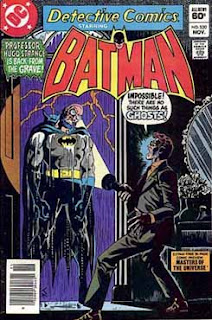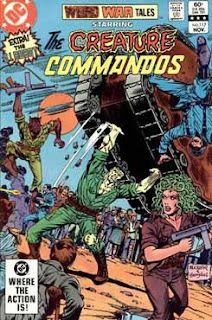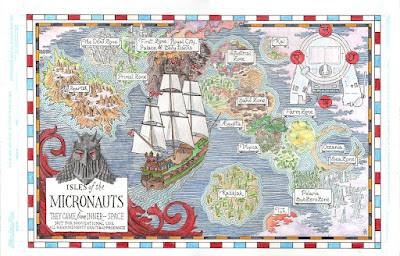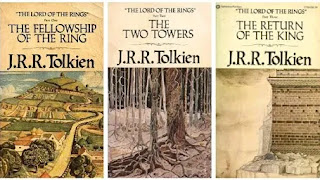Wednesday, August 23, 2023
Wednesday Comics: DC, November 1982 (week 4)
Monday, August 21, 2023
Classic TV Flashback
Over at the Flashback Universe Blog, Jason Sholtis and I have started a series where we watch an episode or two of some "classic" TV show we find on streaming and blog about it. So, far we've watched Mr. Lucky (good) and Gigantor (less good)--a post that debuts tomorrow.
If you're entertainment starved, might be worth a read.
Thursday, August 17, 2023
Sail the Microversal Seas!
Artist Jeff Nelson has imagined Marvel's Microverse from the Micronauts comic as islands in a sea. Only tangentially related, but this reminds me how the Microverse would be a good Spelljammer setting.
Wednesday, August 16, 2023
Wednesday Comics: DC, November 1982 (week 3)
Monday, August 14, 2023
Dead Spacemen and the Clockwork Princess
Last week, I forgot the session report on our last Land of Azurth 5e game, so here it is. The party was still in the labyrinthine, ramshackle of Junk City. The former Mayor of Rivertown, Gladhand, though ailing from a mysterious attack was able to lead them to where Viola, the Clockwork Princess of Yanth Country (who has been absent for quite some time) was hiding out. Turns out it's in a shabby temple to Clockwork--but that's really just a front for her operation to build--well, some sort of weapon, she didn't elaborate to fight the Wizard and his shadowy allies.
The party is a bit nervous about this as last time they saw her (in the future) she was crazy and on a rampage. They ask a lot of questions to probe for signs. She seems her same old self though, and she has a mission for them. She needs them to still a power source from a crashed spaceship to power her weapon.
The party agrees, but later maybe they wish they hadn't as the remnant of the ship's crew are undead. At least one of them a fairly powerful undead with the power to drain life. It's a close call for Erekose, but the group wears the creature down.
They still haven't found the power core, though.
Friday, August 11, 2023
The Mixed Up Setting
Sometimes, always with an eye toward being able to use the published material for some well-supported game or another, I get (possibly mad) idea to take parts of one setting and combine with another so that the result wouldn't immediately be recognizable.
Ideas I've had in the past playing a wuxia game using the map of Middle-Earth (and MERP materials), The Known World replaced with Talislanta equivalents, or Creation from Exalted, but built as a D&D setting (using published 5e material).
I've never done any of these as at the end of the day the work required wouldn't be that much less than making up my own stuff in some instances, but it's still an idea that pops up from time to time.
Thursday, August 10, 2023
Swords Against Sorcery: Archetypes
In the game I'm working on, all PCs are defined in part by two Archetypes. These represent types of characters found in comic book Sword & Sorcery. In game terms, they provide bonuses to Attributes and Domains and also special abilities.
Each archetype has a primary and secondary Attribute and Domain. Should a player pick two Archetypes with the same primary Attributes/Domains they can use that one and their choice of the two Archetypes secondary Attributes/Domains. The character also gains the Expertises and Talents of each Archetype.
While the Archetypes remain a work in progress, below is a sampling of the ones I've come up with. At this point, the plan is not to give any description of them beyond the abilities they provide, letting players interpret them as they will.
Domains: Words (Sorcery)
Expertise: Religion
Talent: Divine Favor. Make a successful roll to call upon the aid of your gods or guiding spirit. Any successes can be used like Momentum to aid you or another hero for one scene. It does not add to your Momentum pool.
Wednesday, August 9, 2023
Wednesday Comics: DC, November 1982 (week 2)
Monday, August 7, 2023
Lord of the Rings and the Beginning of "Serious" Fantasy
Hear me out!
I'm aware, course, that there are many works that we would now call fantasy that predate Lord of the Rings, but the conception of fantasy as a specific genre post-dates those works. The conception of fantasy as a genre grew out of fairy stories, and so what I mean here is a work distinct from fairy tale that nevertheless contains the elements of fairy tales: elves, dwarves, dragons, etc. The works of Howard, Smith, and others would be been thought of as adventure stories, weird tales, and the like when first published.
Even still, there are older works that that meet that criteria: MacDonald's The Princess and the Goblin, some of Baum's works, and Dunsany's. But all the works I can think of that do they aren't obviously children's works have strong elements of whimsy, irony, and often outright humor. Even Tolkien's own The Hobbit could be so characterized. Lord of the Rings, while not humorless, is much more serious business, though perhaps not as much as Anderson's The Broken Sword, which closely follows it.
Did this seriousness play a role in it's centrality to the emerging genre? I think a bit, though it might be easy to overstate the importance of that one factor. I do think that with Howard and Tolkien sort of being the prevailing template for fantasy has served to influence the tone of a lot of works that followed and the games that inspired them.
Friday, August 4, 2023
Things to Read If the Spirit Moves You
I've gotten into 2 good fantasy novels with connections to British esoteric spiritual belief at the turn of the 20th Century which are both good reads and good gaming inspiration.
Summerland by Hannu Rajaniemi
I've praised Rajaniemi's science fiction work before. Here he goes for an alt-history and alternate physics in a spy-fi story set in 1938 were Summerland (the 4-dimensional space where the dead go) s being exploited with etheric technology and Britain and the Soviet Union are involved in an escalating proxy war in the Spanish Revolution. Behind all that are mysteries regarding the afterlife: where do souls come from? And why isn't Summerland full of ghostly civilizations? (Not all these questions are answered!) The spy stuff reminds me of a couple of novels by Tim Powers (particularly Declare) but the very science fictional rigor applied to the mechanics of afterlife physics is all Rajaniemi's own.
The Revolutions by Felix Gilman
Gilman is another author I've praised previously. In this one, a young couple in Victorian London gets involved in an attempt by a occult cabal's ambitious attempt to visit Mars by means of astral projection, but in doing so they make themselves targets in a magical war being waged between occult societies. One of the highlights here for me is how magic is portrayed in a way that is powerful, but somewhat subtle. A duel between magicians involves bystanders controlled or charmed into hurling insults or punches rather than mages hurling bolts of glowing energy.
Thursday, August 3, 2023
Weird Revisited: Combat as Bloodsport
A common reframe in the old school landscape is "Combat as War vs. Combat as Sport," often used to negatively contrast elements of 5e and particularly 4e concerned with encounter balance and "the encounter" as a fundamental unit of game action in general with the old school. Without getting into the merits of how this argument is typically framed, I think that even if we accept this as true, there is a way to lean into those elements of modern D&D and come out with something cool. Instead dungeoncrawling for treasure (mainly), maybe the dungeon environment could be the battleground of a big tournament.
X-Crawl deals with some of this territory, I guess, but from what I read of it, it is set in the modern day, and seems very much concerned with the celebrity aspect of things, bringing in a lot of professional athlete cliches. All well and good, but I'm more interested in something more like Dragonball Z. The fighters are in it often for the personal betterment--a personal betterment that is practically apotheosis, which dovetails nicely with D&D advancement. What if the gods or immortals or whatever design the dungeons as tournament grounds, and foundries to forge new exalted beings to join their ranks?
In this context, the lack of XP for gold makes perfect sense. Also, "levels" of dungeons are like brackets of a tournament. In order to give a good spectacle, you don't want scrubs advancing to take on the contenders too soon. Mainly playing this sort of setting would just mean thinking about the game differently. The only change might be that there wouldn't be any nameless rabble or humanoid tribes with kids and the like. Everybody in the dungeon is playing the game!
Wednesday, August 2, 2023
Wednesday Comics: DC, November 1982 (week 1)
Thursday, July 27, 2023
Planes of Law--Complete!
Wednesday, July 26, 2023
Wednesday Comics: DC, October 1982 (week 4)
Monday, July 24, 2023
Et in Arcadia Formicae Sunt
Arcadia was born from the schism between Absolute Order and the Archons which believed in transcendence, those who raised up the Heavenly Mountain. The Archons of what would become Arcadia, were in awe of the Mountain, but worried its rigors would not create the optimal balance of Order and Good for the most souls. The Mountain, they felt, risked unacceptable numbers of souls potentially falling to Chaos and error in the name of a goal that might never be attainable. Only through Mechanus could the Cosmos be salvaged, but the algorithms must be modified to reflect the needs of the willful souls of the Primes. Arcadia would be that benevolent Order.
Long ago, the greatest of Arcadia's builders distributed their being among a crafted species. The ant-like formians carry out and carry forward the great working through that divine spark within. For the souls which come to reside in the ordered collectives of Arcadia, the formians are both humble servants and strict correctors of infractions. They model for the other inhabitants self-less service of the community.
Visitors to Arcadia find it a place of great serenity and happiness. Its souls live in ziggurat arcologies with terraced gardens and precise, geometric parks. They are amiable, though highly conformist and given to speaking in aphorisms regarding the virtues of their lifestyle.
It could be said that Arcadia is a benevolent dictatorship. While the souls have a great deal of freedom, there is little tolerance of behaviors which are detrimental to the community. Friendly warnings and lectures are the first response, then tasks meant to create awareness. If those interventions are ineffective or resisted, the community practices ostracism and a truly rebel soul will find the plane itself rejecting them.























































.jpg)








